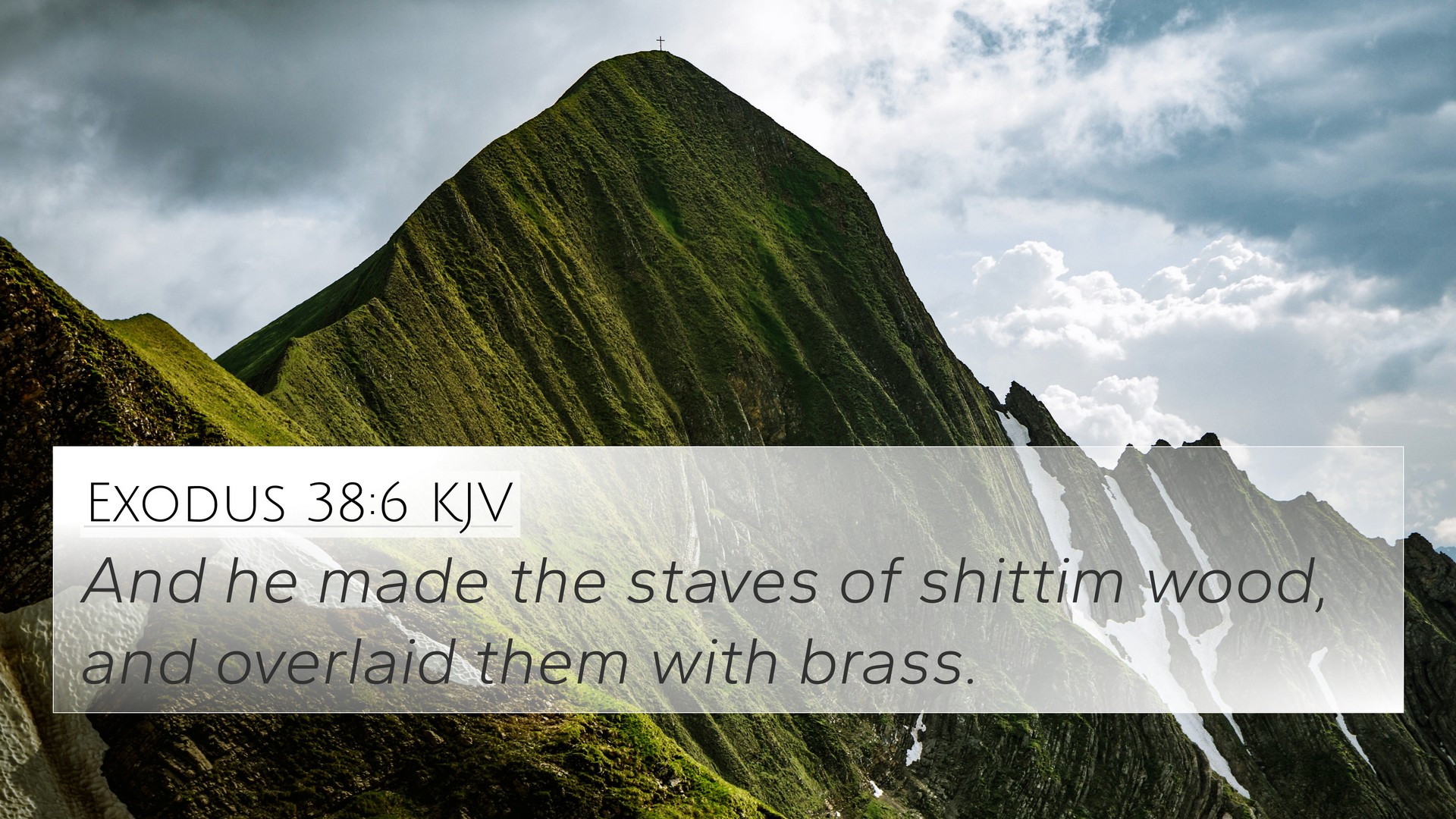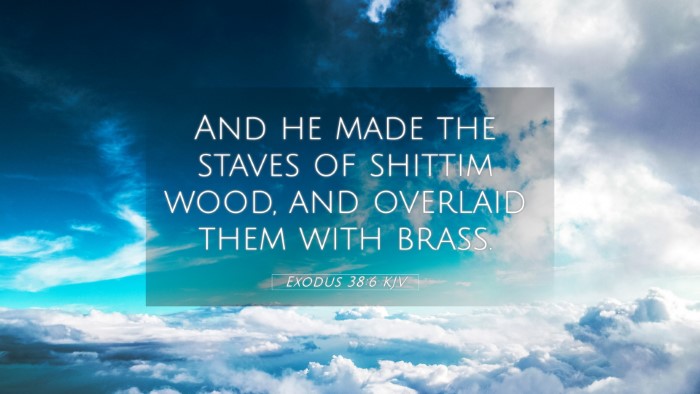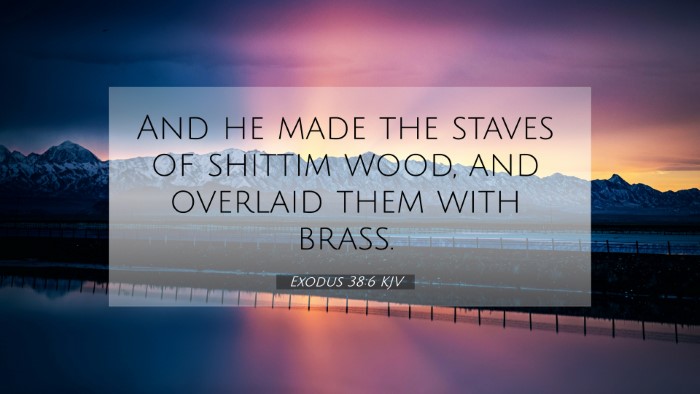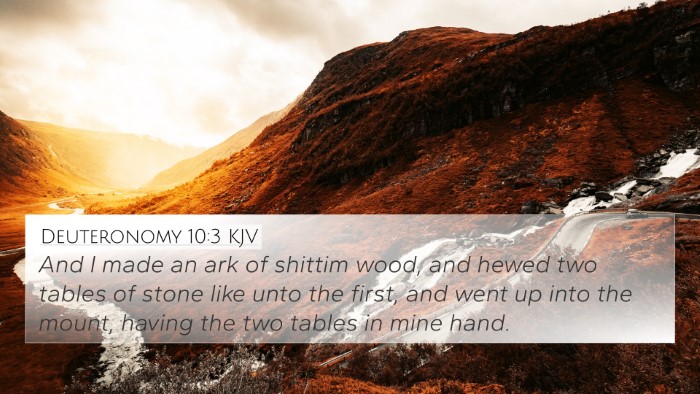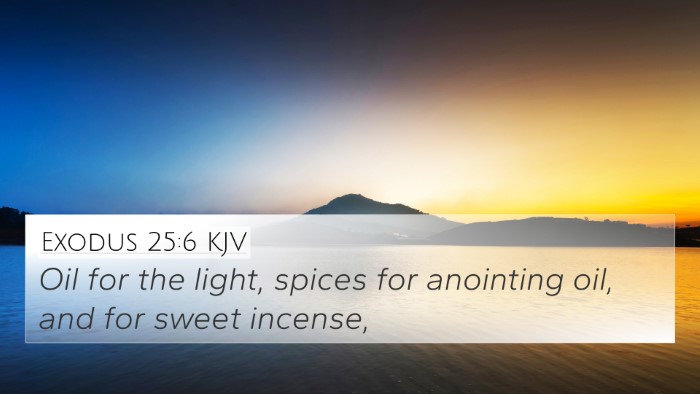Understanding Exodus 38:6
Exodus 38:6 states: "And they made the staves of shittim wood, and overlaid them with brass." This verse is a part of the detailed instructions given for the construction of the Tabernacle, highlighting the specific materials used for the poles (staves) that would bear the Ark of the Covenant.
Summary of Insights from Commentaries
This verse encapsulates significant spiritual truths and practical details regarding the construction of the Tabernacle. Below are insights gathered from public domain commentaries that provide a deeper understanding of the scripture.
Materials Used in the Construction
- Shittim Wood: Matthew Henry notes that shittim wood (or acacia) is a symbol of durability and strength, indicating that the material was chosen for its quality to endure the trials of the wilderness.
- Brass Overlay: Albert Barnes suggests that the brass overlay signifies strength and judgment, which can reflect the holiness of God and the necessity of purity in worship.
Theological Significance
The combination of these materials is deeply symbolic:
- Strength and Endurance: As noted by Adam Clarke, the use of durable shittim wood reflects God’s provision for His people, allowing them to worship Him securely as they journey through challenges.
- Holiness and Judgment: The brass symbolizes the need for divine judgment and presents a contrast to the imperfection of man, drawing attention to the requirement of sacrifice and atonement.
Connections to Other Bible Verses
Exodus 38:6 has numerous cross-references throughout the Bible, providing a web of connections that enrich our understanding:
- Exodus 25:10: Details the construction of the Ark of the Covenant, which the staves are to support.
- 1 Chronicles 15:15: Relates to the carrying of the Ark, emphasizing the presence of the Lord among His people.
- Hebrews 9:4: References the contents of the Ark, connecting the Old Testament practices with New Testament revelations.
- Numbers 3:31: Discusses the responsibilities of the Levites concerning the Tabernacle, showing their role in the sacred assembly.
- Psalm 119:105: "Thy word is a lamp unto my feet, and a light unto my path,” drawing a parallel of guidance as found in God's commandments.
- 2 Corinthians 4:7: Where Paul discusses the treasure in earthly vessels, connecting the divine purpose with human frailty.
- Matthew 5:14: "Ye are the light of the world," reflecting the role of believers in embodying the presence of God.
Thematic Connections
By examining Exodus 38:6, we can explore broader themes such as:
- Divine Structure: The meticulous design of the Tabernacle aligns with God’s intention for order in worship.
- Holiness of God: The materials reflect the need for purity and reverence in approaching God, a theme echoed throughout both testaments.
- Christian Community: The staves' role in transporting the Ark signifies community involvement in worship and the importance of shared faith experiences.
Practical Applications
The lessons from this verse can guide our daily lives:
- Commitment to Quality: Just as the Israelites used the best materials for worship, we too are called to offer our best to God in service and devotion.
- Understanding Holiness: Acknowledging the significance of righteousness in our lives, echoing the idea that God’s presence demands a response of purity.
- Community in Worship: The verse encourages fostering a sense of community where believers support one another in worshiping the Lord.
Conclusion
In examining Exodus 38:6, we recognize the intricate connection between the physical construction of the Tabernacle and the spiritual principles it embodies. The insights gained from various commentaries highlight the significance of each material and the overarching theme of holiness in worship, while the cross-references provided deepen our understanding of its implications for both historical and modern believers.
